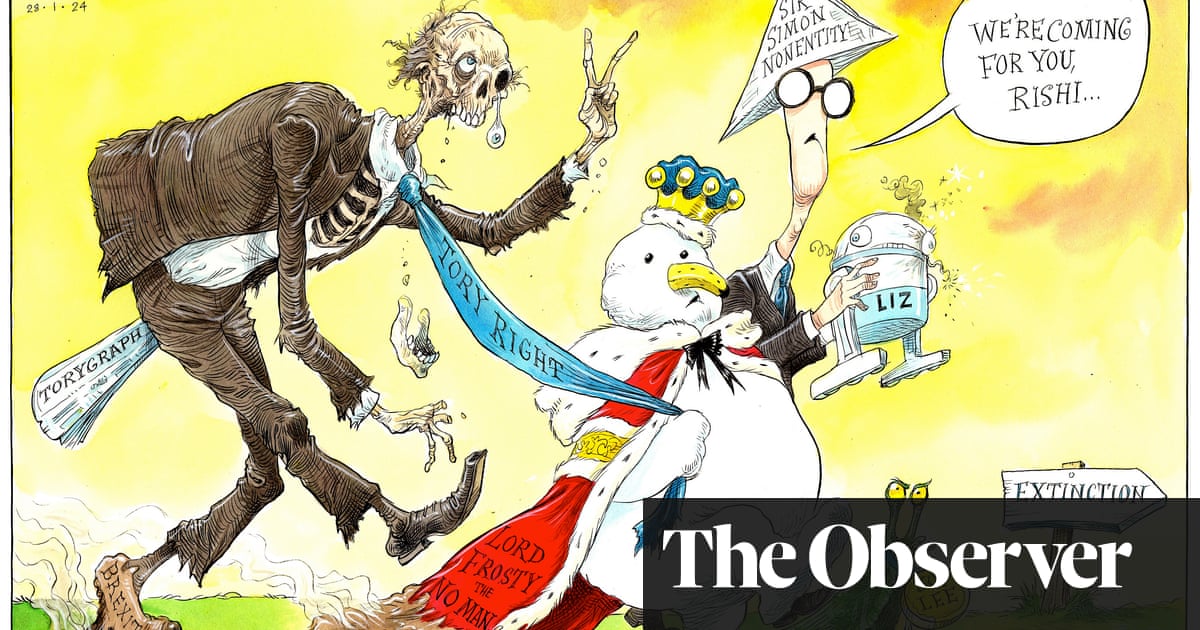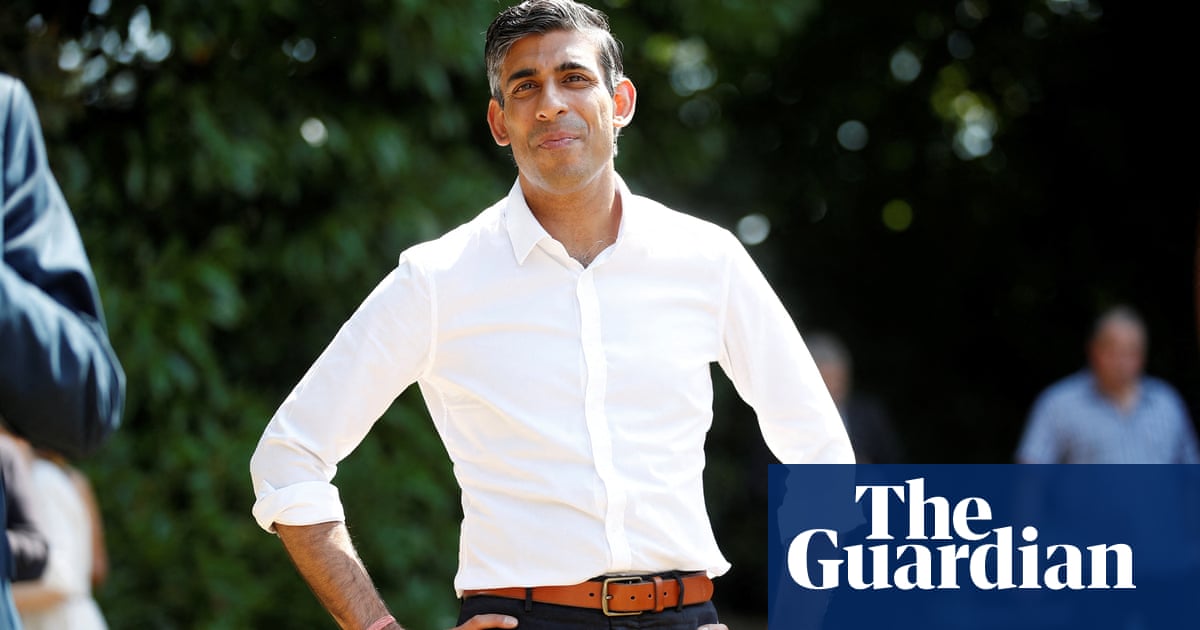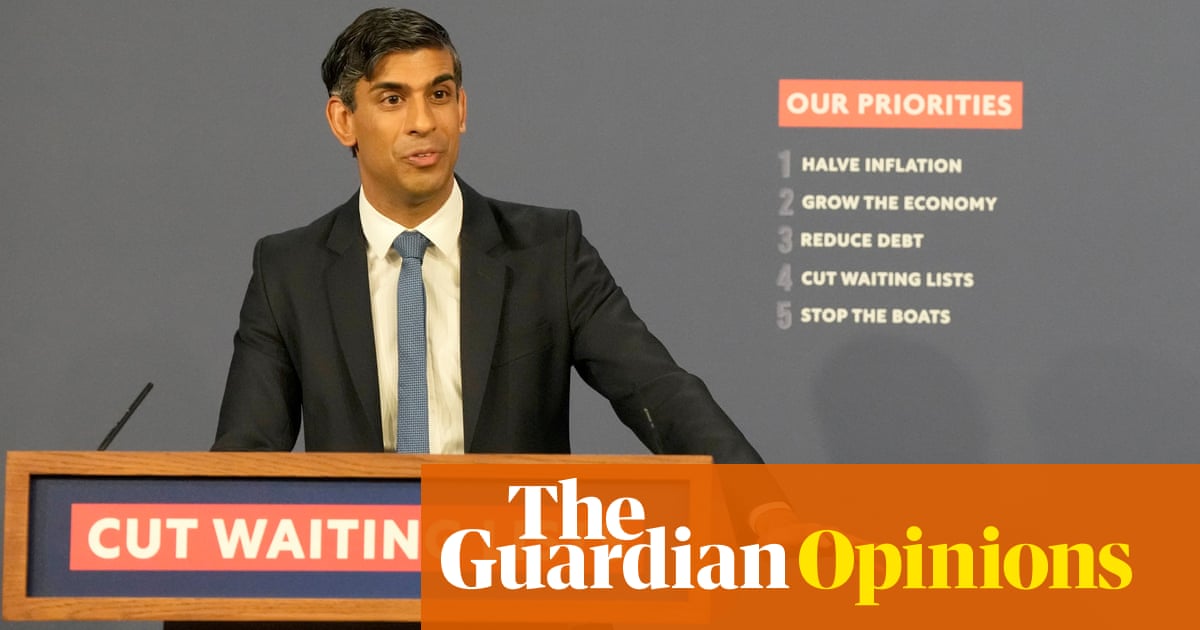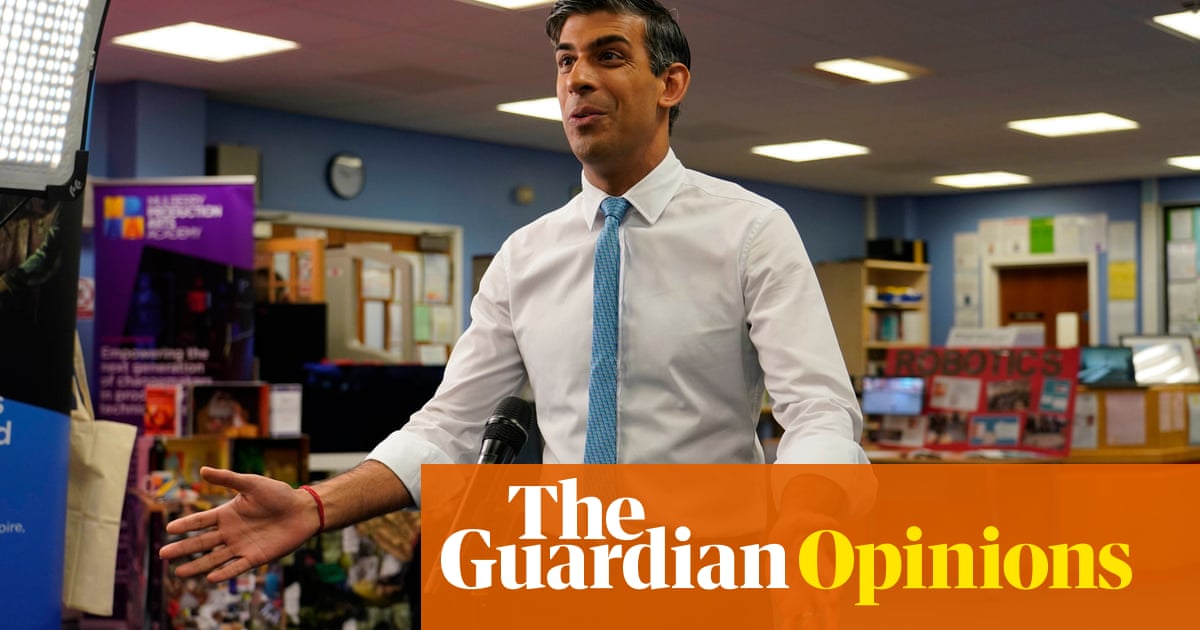
One member of the cabinet likes to amuse himself at meetings with his civil servants by making ludicrous statements in order to test whether the officials can stop themselves laughing in his face. “In the highly unlikely event that the Conservatives lose the election and Labour forms the next government,” he will begin a sentence and watch as his staff “struggle to stifle their sniggers”.
The notion that the Tories will be returned to power for what would be a fifth consecutive term has become more snigger-worthy as this year has unfolded. That is the core explanation for the evaporation of Conservative faith in Rishi Sunak and the strengthening of Sir Keir Starmer’s authority over Labour. This was not universally regarded as a given when the year began. Back in January, it was possible to find Tory optimists able to muster a case that Labour’s poll lead would begin to shrivel. The idea that Mr Sunak might have it in him to pull off an against expectations rebound, replicating what John Major did in the run-up to the 1992 election, was much discussed. It was not hard to find Labour worriers who feared their party would contrive to snatch defeat from the jaws of victory.
Twelve months on, even the most congenitally gloomy Labour folk are sounding persuaded that power is now within touching distance while even the most innately upbeat Tory types find it hard to muster any reasons to be cheerful. One senior Conservative tells me that, over the year, “I’ve reduced our odds on winning from 30% to 10% to 1%.”
Parliament broke up for its seasonal break with Labour 20 points ahead in the polls. It has enjoyed that level of advantage or thereabouts all year. The message of the polls has been reinforced by real votes in real ballot boxes. The Tories were pulverised at the local elections in May and have lost four parliamentary byelections with colossal anti-government swings. Their one victory, in the outer London seat of Uxbridge, briefly rained on Sir Keir’s parade and brought a rare glimpse of sunshine to the Tories. Uxbridge now looks like a “dead cat bounce”, the phrase coined by Wall Street traders to describe a small, temporary recovery in a stock on a downward plunge. Two more byelections, triggered by more scandalous conduct by miscreant Tory MPs, beckon in the new year, threatening further morale-crushing defeats for the Conservatives.
According to the regular survey run by the ConservativeHome website, the prime minister is now the most unpopular member of the cabinet among Tory activists. That’s quite a feat when you look at some of the competition. “Nothing is working,” sighs one veteran Conservative who has been around long enough to have been present for his party’s dramatic ejection from power in 1997. “We may have reached the stage where nothing will work.”
Given the toxic legacy inherited by Mr Sunak, you can make a case that even a political genius would be hard pushed to turn things around for the Tories. Yet there are important respects in which he has not helped himself. At the beginning of the year, he staked his reputation as a competent problem-solver on delivering five hand-picked “priorities”. He asked the country “to judge us” on the results. Maths being one of his stronger suits, the Tory leader will grasp that one out of five is not a scorecard that can be bragged about. The one pledge that has been met – halving inflation – owes more to interest rate hikes by the Bank of England and gyrations in global energy prices than it does to anything done by the prime minister. Of the other two economic pledges, national debt is now higher, not lower, than it was in January, and most forecasters think we are ending the year with the economy not growing but stagnant or even contracting. It has long been the belief of people close to Mr Sunak that the Tories can’t be electorally competitive if they fail to show the voters some signs that the performance of the NHS is improving. The latest figures for waiting lists in England, which are for October, show a tiny improvement on September, but remain higher than when the Tory leader pledged to bring them down. The sense that nothing works as it should do in “broken Britain” has deepened over the past 12 months, not least because of the revelation that many of our school buildings are crumbling because they are built out of popcorn. The government is boasting of some progress in curbing the flow of cross-Channel migration, with the deal to return Albanian migrants bringing down the numbers compared with 2022. Had Mr Sunak said he would reduce the traffic, he might be able to hail a promise redeemed, but he recklessly tied himself to an unachievable pledge to “stop the boats”.
The Tory party’s fixation with deporting asylum seekers to Rwanda is damaging to them twice over
The Tory party’s fixation with deporting asylum seekers to Rwanda is damaging to them twice over. Very few voters believe that any planes will take off before the election. To the minority who care intensely about this issue, the latest parliamentary psychodramas, and the ones that will follow in the new year, draw further attention to Tory failure to deliver what they have promised. Obsessiveness about this subject is a turn-off for the much greater numbers of voters who are far more concerned about the dilapidated state of public services and the severity of the cost of living crunch.
“He’s fucking terrible at politics,” a former Conservative cabinet minister groaned to me in the autumn during Mr Sunak’s badly executed and highly divisive U-turns on net zero and HS2. That view has become more prevalent within his party as the year has grown older. The more moderate Tory MPs have been confounded in their previous belief that “steady” Sunak might save their skins. The head-banger right is almost entirely animated by preparing for the battle for control of the Tories in opposition after an election defeat that they treat as inevitable.
A series of gambits to “reset” the government has flopped. The most preposterous of these attempted rebrands was the conference speech in which Mr Sunak attempted to sell himself as the “change candidate” who was the answer to 30 years of failure, a pitch that disgruntled all his living Tory predecessors as prime minister without impressing the voters. The most shallow relaunch was a themeless king’s speech that wowed neither the electorate nor his own MPs. The cabinet reshuffle and the subsequent resurrection of David Cameron failed to move the dial. Neither did an autumn statement that claimed to be tax-cutting when taxes are actually heading towards a record peacetime high.
Mr Sunak was offered one golden opportunity to repudiate his party’s discredited past and give the voters a reason to think of him as a fresh start. That chance he spurned. When the privileges committee found Boris Johnson guilty of lying to parliament, the prime minister should have turned up in the Commons to vote to endorse that verdict, both because it was the right thing to do and to be true to his pledge to restore “professionalism, integrity and accountability” in public life. He instead chose the coward’s way by inventing an excuse to be elsewhere.
Politics is often a confidence game. Success breeds success, failure foments failure. The Tory leader, a man whose previous life had told him he was a winner, has struggled to put a brave face on experiencing being a loser. It has become commonplace, even among observers sympathetic to the Tories, to describe him as snippy about criticism and peevish under pressure. He has come over as a less sweary version of his education secretary, Gillian Keegan, when she was caught on camera moaning that she didn’t get the recognition she reckoned she deserved for doing a “fucking good job”. Rattled Rishi is not an attractive nom de guerre when an election is coming. By contrast, sustaining a large poll lead has done wonders for the confidence of Sir Keir. The hardening assumption that he is Britain’s next prime minister gives him the platform for the withering mockery with which he now treats the incumbent. The PM ends this year with personal approval ratings that have become atrocious enough to be comparable with the depths plumbed by Boris Johnson at the time of his defenestration, though they are not yet quite as terrible as those of Liz Truss at her nadir. There doesn’t have to be an election for another 13 months. So Mr Sunak has still got time to work on breaking her record.
Andrew Rawnsley is the Chief Political Commentator of the Observer












